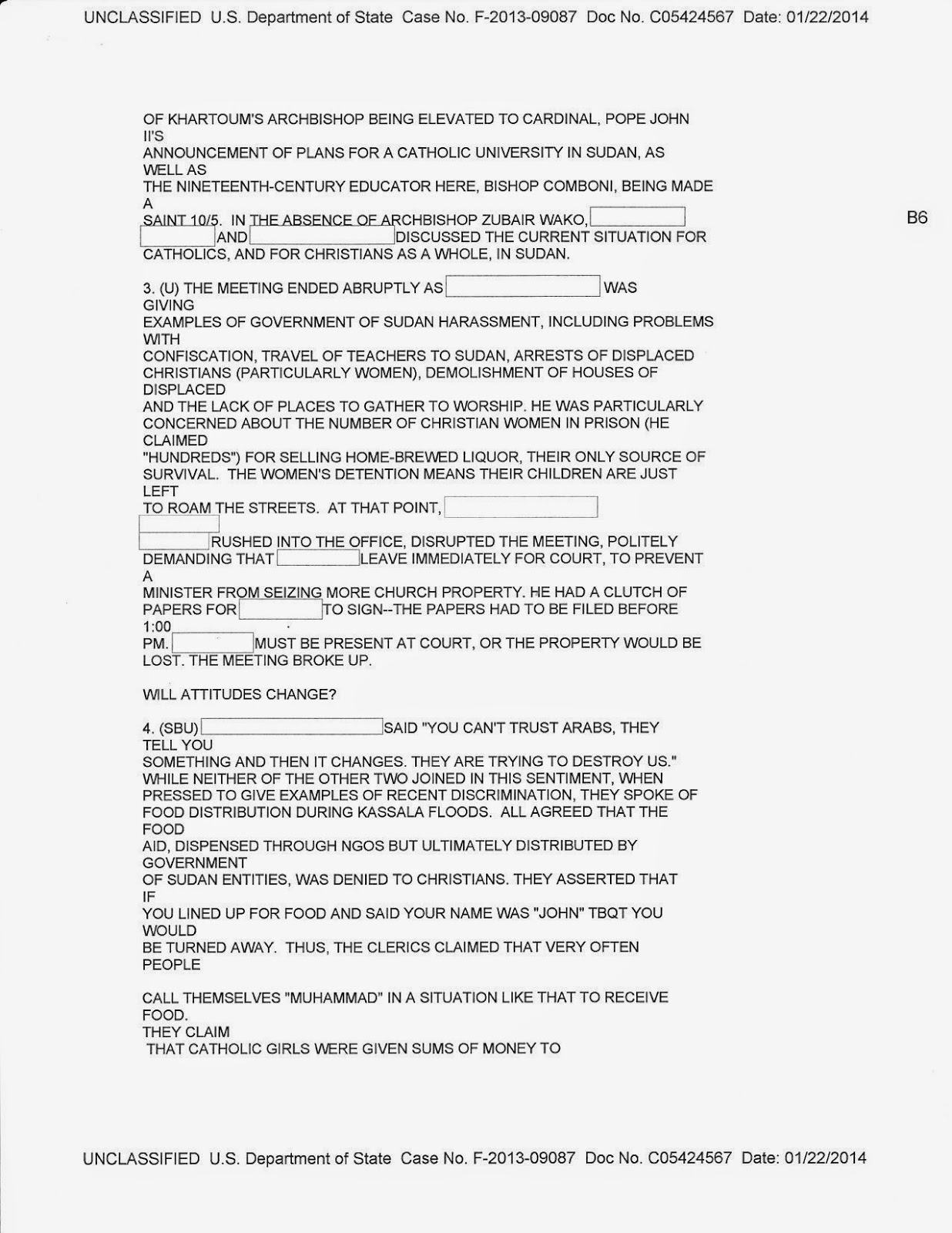ARABIC
PRESS REVIEW*
10/10/2003
AL
RAI AL AAM:
SUDANESE-AMERICAN
AGREEMENT ON PRACTICAL STEPS TO NORMALIZE RELATIONS:
Sudan
and the United States agreed to start practical and preparatory steps
to normalize bilateral relations during the forthcoming phase.
Upon
his meeting with Gerard Gallucci, US Charge before he returns to
Washington, Dr. Mustafa Osman, Foreign Minister affirmed Sudan’s
keenness to continue communication and coordination with the United
States on all pending issues between the two countries.
For
his part, Gallucci reiterated the US Administration is determined to
take positive step immediately after the government and the SPLM sign
the peace agreement.
The
US diplomat who will discuss the horizons of relations between the
two countries with the officials in Washington expressed his content
of his country at the outcome of Dr. Ismail’s meeting in
Washington.
He
commended the Foreign Minister’s efforts exerted to normalize
relations between the two countries. He applauded the President’s
speech during the inaugural session of the National Assembly and
welcomed the political leadership’s pledge to commit to realize
peace and to expand freedoms, freedom of speech and organization in
particular.
DR.
GHAZI HELD CONTACTS WITH EL SADIG AND EL MIRGHANI ON THE POLITICAL
FORCES’ PARTICIPATION IN THE TALKS
HE
WILL HOLD A PRESS CONFERENCE ON SUNDAY
THE
FIRST VICE PRESIDENT: THE PEACE AGREEMENT WILL NOT BE A POLITICCAL
DEAL
THE
PRESIDENT OF THE REPUBLIC: THE STATE’S EFFORTS WILL BE TOTALLY
ENEAVORED TO COMPENSATE THE SUDANESE PEOPLE FOR WHAT THEY MISSED
DURING THE YEARS OF WAR
EL
SADIG EL MAHDI DISCUSSES NIVASHA AGREEMENT WITH EL BAZ
PRESIDENT
OMER EL BASHIR VISITS CHAD TODAY TO HOLD IMPORTANT TALKS WITH DEBY
THE
GOVERNOR OF SOUTH DARFUR: OUT OF CONTROL GROUPS ARE PRACTICING ARMED
ROBBERY IN SOUTH DARFUR
ALWAN:
TRIBUNAL
FOR SUSPECTS INVOLVED IN SABOTAGE ACTIVITY:
Six
suspects appeared before North Khartoum Criminal Court chaired by
Judge Ismat Suleiman Hassan. They were accused of charges regarding
practice of activity hostile to the established regime.
The
Security organs seized this group and accused them of being financed
by a foreign circles that were seeking to provide arms and military
equipment through contacts with arms mongers.
This
group requested to be supplied with 700 guns, grenade, military
uniforms and officers’ and non-commissioned officers’ signs.
The
complainant added before court that the group leased a house in
Khartoum center and used it to practice its activity. A tight ambush
was fixed and the group individuals were seized.
During
investigation it was revealed that one
of the 4 suspects affiliates to an armed faction in the south and has
relationship with the US authorities and he is representative of a
foreign figure in one of the major hotels in Khartoum.
A
PLAN TO INCLUDE THE SOUTHERN RETURNEES IN THE NATIONAL CONGRESS
HEAVY
RAINS IN KHARTOUM
SPLM
OFFICIAL SPOKESMAN: WE AGREED TO NEGOTIATE WITHOUT MEDIATORS AN THE
ISSUE OF THE THREE AREAS IS THE MOST DIFFICULT
THE
FOREIGN MINISTER TURNS DOWN THE BRITISH PROPOSAL TO DISPATCH
INTERNATIONAL PEACEKEEPING FORCES TO SUDAN:
AL
SAHAFA:
ALI
OSMAN, FIRST VICE PRESIDENT: RELEASE OF FREEDOMS AND LIFT OF
GRIEVANCES ARE THE MOST IMPORTANT ASPECTS OF THE FORTHCOMING PHASE
OMER
EL BASHIR CALLS UPON THE NC TO BEAR ITS COMPLETE RESPONSIBILITY TO
LEAD THE FORTHCOMING PHASE
FRENCH
RESERVATION AND SUDANESE REJECTION OF THE PRINCIPLE OF SENDING
PEACEKEEPING TROOPS TO THE COUNTRY
AL
SHARIE AL SIYASSI:
SECRETS!
International
Intelligence reports spoke about a figure that had its account in one of
the world Western banks reached $380 million US dollars. The
Intelligence expressed its astonishment at this amount and said how
could the fortune of a person in a country such as Sudan to be equal
to 30% of the balance of payment!
EDITORIAL:
THE PEOPLE IN THE PEACE FORMULA:
DR.
GHAZI SALAH EDDIN AFFIRMED: THE FORTHCOMING PEACE PHASE DEPENDS ON
APPLICATION AND THE OTHERS’ PARTICIPATION
AL
ANBAA:
THE
US CHARGE COMMENDS AL BASHIR’S SPEECH AND PLEDGES TO URGE HIS
GOVERNMENT TO SUPPORT SUDAN:
GALLUCCI:
THE UNITED STATES IS CONTENT OF DR. MUSTAFA’S VISIT:
The
American Charge in Sudan commended President El Bashir’s speech
before the inaugural session of the NC general conference. He pledged
to address his government and to urge it for more support to Sudan to
realize peace and development.
Dr.
Mustafa Osman, Foreign Minister affirmed Sudan is keen to continue
contacts and coordination with the Untied States on all issues
remained between the two countries.
He
reiterated Sudan appreciates the United States positive contribution
to the peace process.
Yesterday’s
meeting with the US Charge yesterday discussed the outcome of the
Foreign Minister’s visit to Washington and the meetings he held
with officials of the US State Department and the White House in
addition to the Congressmen.
The
US Charge expressed content of the United States at the outcome of
the Foreign Minister’s visit to Washington and commended his
efforts.
AL
ADWAA:
GARANG
THREATENS TO SMASH THE LRA IMMEDIATELY AFTER SIGNING THE PEACE
AGREEMENT
THE
NC DELEGATION WILL MEET WITH THE SPLM IN RUMBECK TOMORROW
POLITICAL
ANALYSIS:
WASHINGTON
AND KHARTOUM ARE FLIRTING WITH EACH OTHER!
THE
US CHARGE COMMENDS AL BASHIR’S SPEECH AND PROMISES FOR A SHIFT IN
RELATIONS
THE
NC WELCOMES THE BRITISH PROPOSAL BUT THREATENS TO RESIST IT IF IT IS
WICKED
THE
NC APPROVES PARTNERSHIP WITH THE SPLM
THE
GENERAL CONFERENCE CALLS UPON THE POLITICAL FORCES FOR A BROAD FRONT
AND CALLS FOR MORE FREEDOMS
THE
RULING PARTY APPROVES THE PRINCIPLE OF ALLOWING ALL PARTIES TO START
THEIR ACTIVITIES AND CALL UPON THEM TO RENOUNCE BITTERNESS
AL
HAYAT:
THE
STATE MINISTER FOR HUMANITARIAN AFFAIRS MET WITH THE USAID DIRECTOR
IN KHARTOUM
_______________________________________________________________________
*Note: Part of the Embassy's daily press review prepared by local staff (Foreign Service National -- FSN) in the public affairs office. The press reflected the messages/spin preferred by the government.




















